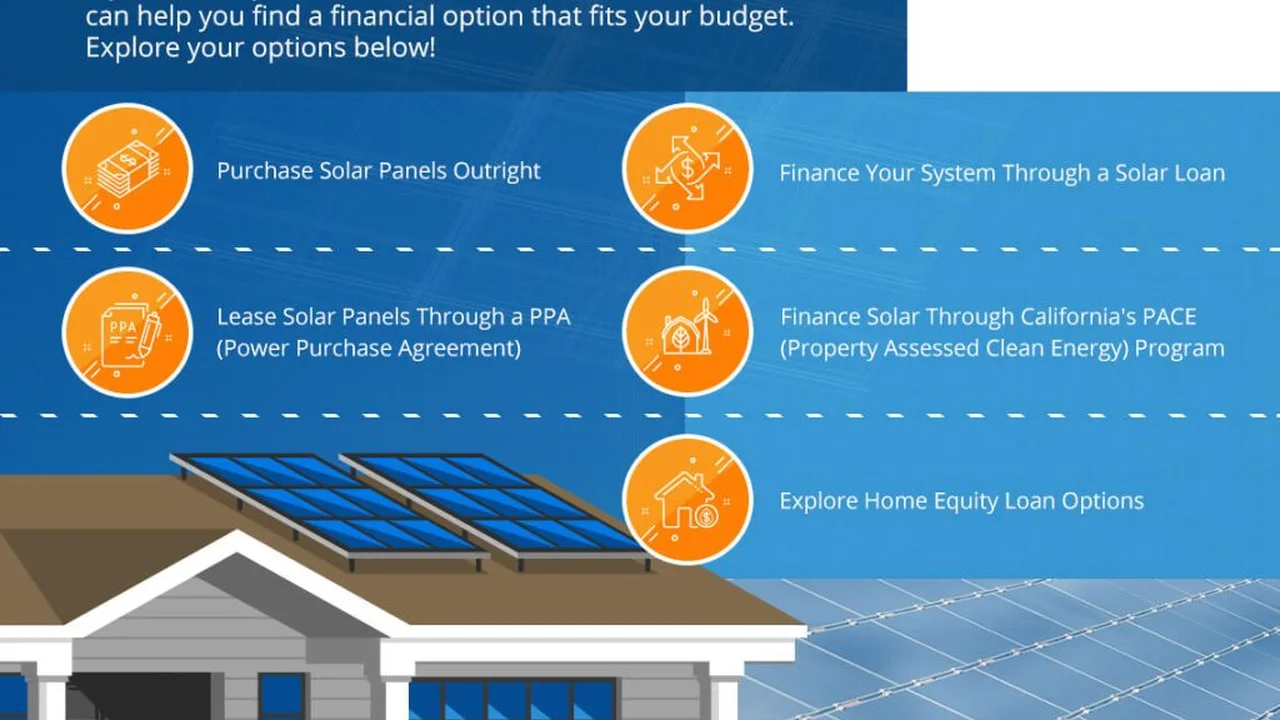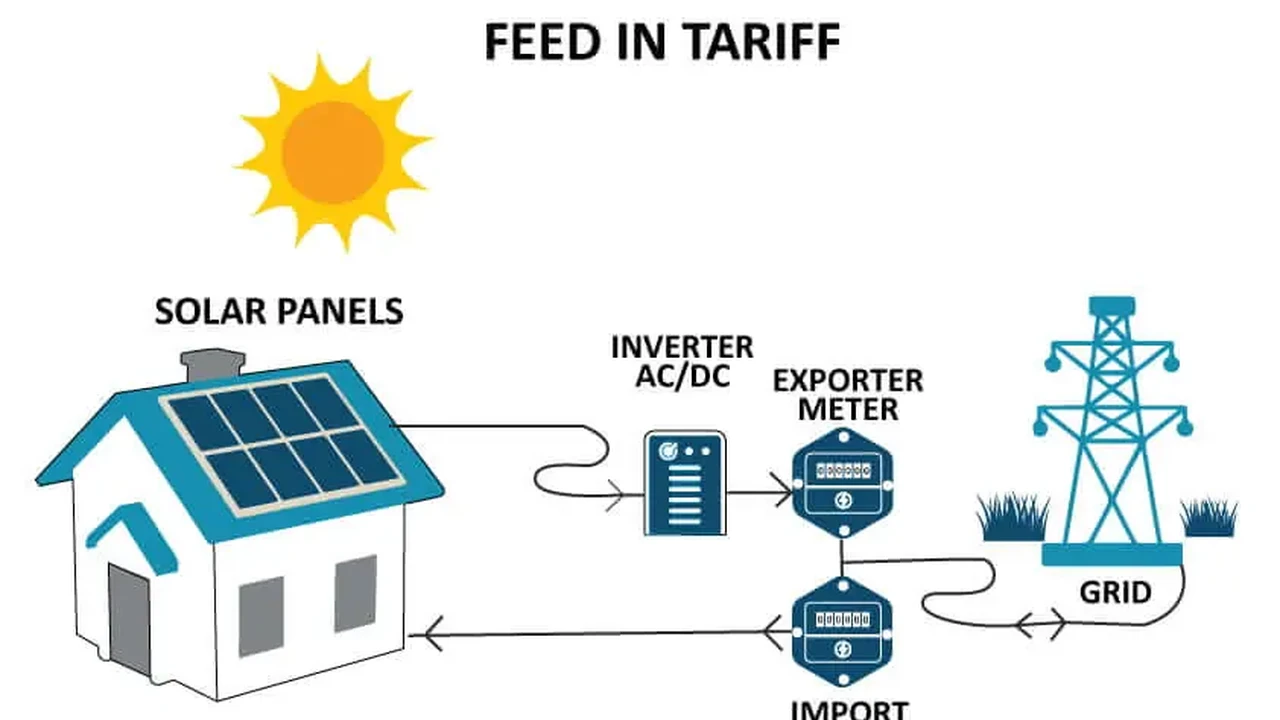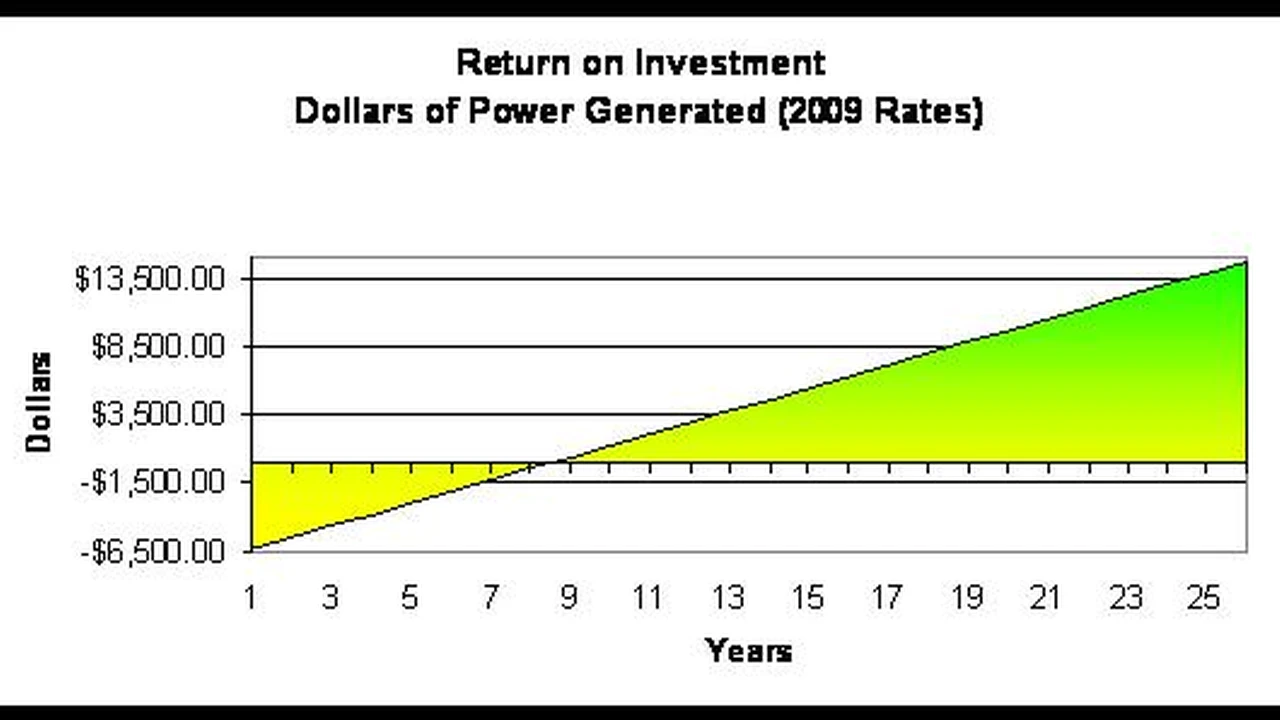Solar Panel Financing Options: Loans, Leases, and PPAs

Understanding Solar Panel Financing Options Loans Leases and PPAs A Comprehensive Guide
So, you're thinking about going solar? Awesome! But the big question is, how are you going to pay for it? Don't worry, you're not alone. Solar panels can be a pretty significant investment upfront, but luckily, there are several solar panel financing options available to make it more accessible. Let's break down the most common ones: loans, leases, and PPAs (Power Purchase Agreements).
Solar Panel Loans The Path to Ownership and Long Term Savings
A solar panel loan is pretty straightforward. You borrow money from a bank, credit union, or solar-specific lender to cover the cost of the solar panel system. You then repay the loan over a set period, typically with fixed monthly payments. This is a great option if you want to *own* your system from day one. Think of it like a mortgage for your roof!
Benefits of Solar Panel Loans
- Ownership: You own the system, which means you get all the benefits, including tax credits, rebates, and SRECs (Solar Renewable Energy Certificates - we'll get to those later).
- Long-Term Savings: Once the loan is paid off, you're essentially getting free electricity (minus any small maintenance costs).
- Increased Home Value: Studies have shown that homes with solar panels tend to sell for more.
- Flexibility: You can often choose the loan term and interest rate that best suits your budget.
Drawbacks of Solar Panel Loans
- Upfront Costs: You'll need to qualify for the loan and may need to put down a down payment.
- Debt: You're taking on debt, which can impact your credit score if you miss payments.
- Responsibility: You're responsible for maintaining the system.
Popular Solar Loan Providers
A few popular solar loan providers include:
- Mosaic: Offers a variety of loan options with competitive rates.
- Sunlight Financial: Specializes in solar loans and offers quick approval processes.
- Hellenbrand Solar: Provides both installation and financing options, making it a one-stop shop.
Solar Panel Leases Rent Your Power and Enjoy Hassle Free Solar
With a solar panel lease, you're essentially renting the solar panel system from a company. You make monthly payments to the company for the use of the panels, and they own and maintain the system. This is a good option if you want to avoid the upfront costs and responsibilities of ownership.
Benefits of Solar Panel Leases
- No Upfront Costs: You typically don't need to put down any money to get started.
- Maintenance Included: The leasing company is responsible for maintaining and repairing the system.
- Predictable Energy Costs: You'll have a fixed monthly payment for your solar energy.
Drawbacks of Solar Panel Leases
- No Ownership: You don't own the system, so you don't get the tax credits, rebates, or SRECs. The leasing company does.
- Limited Savings: Your savings may be less than with a loan, as you're paying for the lease.
- Property Value Concerns: Some potential homebuyers may be hesitant to purchase a home with a solar lease.
- Contract Length: You're typically locked into a long-term contract (15-25 years).
Solar Panel PPAs (Power Purchase Agreements) Pay Only For The Solar Energy You Use
A Power Purchase Agreement (PPA) is similar to a lease, but instead of paying a fixed monthly fee, you pay for the electricity generated by the solar panels. The solar company owns and maintains the system, and you pay them a set rate per kilowatt-hour (kWh) of electricity.
Benefits of Solar Panel PPAs
- No Upfront Costs: Like leases, PPAs typically require no upfront investment.
- Maintenance Included: The solar company handles all maintenance and repairs.
- Lower Electricity Bills: You'll likely pay a lower rate for solar electricity than you would for electricity from the grid.
Drawbacks of Solar Panel PPAs
- No Ownership: You don't own the system and don't receive tax credits or rebates.
- Limited Savings: Your savings may be capped by the PPA rate.
- Contract Length: PPAs typically have long-term contracts.
- Potential Rate Increases: The PPA rate may increase over time.
Comparing Solar Panel Financing Options Loans vs Leases vs PPAs Which Is Right For You
So, which option is best? It really depends on your individual circumstances and priorities. Here's a quick comparison table:
| Feature | Solar Loan | Solar Lease | Solar PPA |
|---|---|---|---|
| Ownership | Yes | No | No |
| Upfront Costs | Yes (Down Payment) | No | No |
| Maintenance | Your Responsibility | Solar Company | Solar Company |
| Tax Credits/Rebates | You Receive | Solar Company Receives | Solar Company Receives |
| Long-Term Savings | Highest Potential | Moderate | Moderate |
If you want to own your system, maximize your savings, and take advantage of tax credits, a solar loan is likely the best option. If you want to avoid upfront costs and maintenance responsibilities, a solar lease or PPA might be a better fit.
Specific Solar Panel Product Recommendations and Pricing
Alright, let's talk about some specific solar panels you might consider, along with their general pricing and best-use scenarios. Keep in mind that prices can vary depending on your location, installer, and the size of your system.
LG NeON 2 Solar Panels High Efficiency and Performance
Product: LG NeON 2
Description: LG NeON 2 panels are known for their high efficiency and sleek design. They're a great option for homeowners who want to maximize energy production in a limited space.
Usage Scenario: Residential rooftops, especially those with limited sun exposure.
Pros: High efficiency, durable, aesthetically pleasing.
Cons: Higher price point.
Estimated Price: $3.00 - $4.00 per watt installed.
Panasonic EverVolt Solar Panels Reliability and Long Warranty
Product: Panasonic EverVolt
Description: Panasonic EverVolt panels are known for their reliability and long warranty (typically 25 years). They offer excellent performance and are a solid choice for homeowners looking for a long-term investment.
Usage Scenario: Residential and commercial rooftops.
Pros: Excellent reliability, long warranty, good performance.
Cons: Can be more expensive than some other options.
Estimated Price: $2.80 - $3.80 per watt installed.
REC Group Alpha Series Solar Panels Power and Durability
Product: REC Group Alpha Series
Description: REC Group Alpha Series panels are known for their high power output and durability. They are a good option for homeowners who want to maximize energy production and are located in areas with harsh weather conditions.
Usage Scenario: Residential and commercial rooftops, particularly in areas with high winds or snow loads.
Pros: High power output, durable, good performance in low-light conditions.
Cons: Can be slightly less aesthetically pleasing than some other options.
Estimated Price: $2.70 - $3.70 per watt installed.
Q CELLS Q.PEAK DUO Series Solar Panels Value and Performance
Product: Q CELLS Q.PEAK DUO Series
Description: Q CELLS Q.PEAK DUO Series panels offer a good balance of performance and affordability. They're a great option for homeowners who are looking for a cost-effective solar solution without sacrificing too much performance.
Usage Scenario: Residential rooftops.
Pros: Good value, decent performance, reliable.
Cons: Not as efficient as some of the premium options.
Estimated Price: $2.50 - $3.50 per watt installed.
Comparing Solar Panel Brands Which is the Best Solar Panel Brand for You
Choosing the right solar panel brand is crucial. Here's a quick comparison of the brands we just discussed:
| Brand | Key Feature | Price Range (per watt installed) | Best For |
|---|---|---|---|
| LG | High Efficiency | $3.00 - $4.00 | Limited space, maximizing energy production |
| Panasonic | Reliability & Warranty | $2.80 - $3.80 | Long-term investment, peace of mind |
| REC Group | Power & Durability | $2.70 - $3.70 | Harsh weather conditions, high power needs |
| Q CELLS | Value & Performance | $2.50 - $3.50 | Budget-conscious homeowners |
Remember to get quotes from multiple installers and compare the total system cost, including installation, permits, and any other fees. Don't just focus on the price per watt – the overall system efficiency and the installer's reputation are just as important.
Understanding Solar Panel System Costs and Savings A Real World Example
Let's say you install a 6kW solar panel system using Q CELLS panels, costing around $18,000 (6kW x $3.00/watt). Depending on your location and electricity usage, you could save hundreds or even thousands of dollars per year on your electricity bill. Factor in any tax credits or rebates you might be eligible for, and the payback period for your system could be as short as 5-7 years. After that, you're essentially getting free electricity!
The Future of Solar Panel Financing Options More Innovative Solutions on the Horizon
The solar industry is constantly evolving, and new financing options are always emerging. Keep an eye out for innovative solutions like community solar programs, which allow you to purchase solar energy without installing panels on your own roof, and energy storage systems, which can help you maximize your solar savings by storing excess energy for later use. The future of solar is bright, and there's never been a better time to go solar!
SRECs (Solar Renewable Energy Certificates) Explained Another Way To Save Money
Speaking of saving money, let's touch on SRECs. In some states, you can earn Solar Renewable Energy Certificates (SRECs) for every megawatt-hour (MWh) of electricity your solar panels generate. You can then sell these SRECs to utilities to help them meet their renewable energy mandates. The value of SRECs can vary depending on the state, but it can be a significant source of income for solar panel owners. Check with your local utility or solar installer to see if SRECs are available in your area.
Finding the Right Solar Installer Near You Tips and Tricks
Choosing the right solar installer is just as important as choosing the right financing option. Get quotes from at least three different installers and compare their prices, equipment, warranties, and customer reviews. Make sure the installer is licensed and insured, and ask for references from previous customers. A good solar installer will be able to answer all of your questions and help you choose the best solar solution for your needs.
Common Solar Panel Financing Mistakes to Avoid Do Your Research
Before you sign on the dotted line, make sure you understand all the terms and conditions of your solar financing agreement. Don't be afraid to ask questions and get clarification on anything you're unsure about. Avoid high-pressure sales tactics and be wary of any offer that seems too good to be true. Do your research and choose a reputable solar installer and financing provider.
Is Solar Panel Financing Right For You A Final Thought
Going solar is a big decision, but it can be a rewarding one. By understanding the different financing options available and doing your research, you can make an informed decision that's right for you. So, take your time, explore your options, and get ready to harness the power of the sun!
:max_bytes(150000):strip_icc()/277019-baked-pork-chops-with-cream-of-mushroom-soup-DDMFS-beauty-4x3-BG-7505-5762b731cf30447d9cbbbbbf387beafa.jpg)





